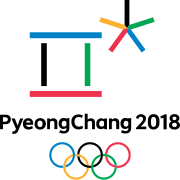Koreas hold joint training session for Olympics
Tuesday, January 30, 2018

Image: Valentim. (Reuse terms.)
On Sunday, female ice hockey players from North and South Korea joined one another for a training session before the upcoming Winter Olympics. Players from the two Koreas are to compete together as a united team for the events hosted in Pyeongchang, South Korea, which are scheduled to start on February 9; Seoul's Unification Ministry said. The cross-border gesture is part of diplomatic efforts to ease tensions on the divided Korean Peninsula and the team was approved by the International Olympic Committee.
The International Olympic Committee selected Pyeongchang in 2011 to host the event, marking South Korea's first opportunity since the 1988 Summer Olympics in Seoul. The earlier event was marred by violence as North Korea had bombed a South Korean flight several months prior, killing over 100 and boycotted the event. Inter-Korean relations have changed considerably in the ensuing thirty years, including the two sending unified teams for table tennis and youth football in other non-Olympic competitions.
The announcement that the two countries would compete together was a stated goal of South Korean President Moon Jae-in. Last year, he announced the proposal and the two nations went into discussion this month. After two weeks, they made the announcement to field a consolidated 35-strong team of ice hockey players and have joint skiing exercises with both team coaches involved.
According to Yonhap News Agency estimates, about 80% of South Koreans support dialogue, but the move to have a joint team has been controversial. Over 10,000 South Korean citizens sent a petition to South Korean President Moon opposing the union and a group of North Korean defectors held a protest at the South Korean National Assembly on January 24, tearing apart photos of the North Korean leader, Kim Jong-un. Public support for eventual reunification of the Korean peninsula has waned in recent years, with the younger generation more skeptical of the possibility.
Related news
- "South Korean city wins 2018 Winter Olympics" — Wikinews, July 6, 2011
Sources
- Alina Polianskaya. "North and South Korean hockey players hold first joint training session ahead of Winter Olympics" — The Independent, January 28, 2018
- Eric Talmadge of the AP. "Koreas try out Olympic diplomacy at North Korean ski resort" — San Francisco Chronicle, January 28, 2018
- Kim Tong-Hyung for the AP. "Activists rip Kim Jong Un's photo in Olympic protest" — Newsday, January 23, 2018
- Reuters reporting. "Koreas to form unified ice hockey team, march together in Olympics" — CNBC, January 17, 2018
- Yonhap News Agency. "Poll: Most South Koreans support inter-Korean dialogue" — United Press International, June 22, 2017
- Ben Birnbaum. "Generation Why" — The New Republic, July 28, 2011
